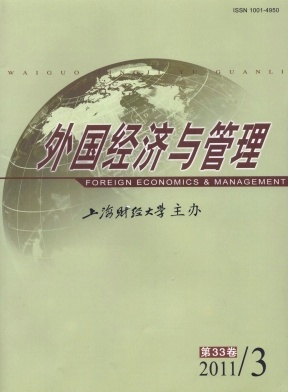工作—家庭角色转换影响因素研究评介
外国经济与管理 2011 年 第 33 卷第 03 期, 页码:50 - 57
摘要
参考文献
摘要
在当前的组织背景下,员工普遍存在工作—家庭角色转换问题,如何有效管理角色边界,实现工作—家庭角色转换的正溢出效应值得深入思考。本文将角色转换作为一种跨越边界的活动,梳理了工作—家庭角色转换的相关概念,依次分析了角色边界特征、角色认同、组织环境强度以及社会文化背景对工作—家庭角色转换的影响作用,并在此基础上构建了工作—家庭角色转换影响因素综合模型,最后指出了边界管理视角下工作—家庭角色转换研究的实践意义和未来方向。
[1]Barnett,R C,and Hyde,J S.Women,men,work,and family:An expansionist theory[J].American Psychologist,2001,56(10):781-796.
[2]Parasuraman,S,and Simmers,C A.Type of employment,work-family conflict and well-being:A comparative study[J].Jour-nal of Organizational Behavior,2001,22(5):551-568.
[3]Eby,L T,Casper,W J,Lockwood,A,Bordeaux,C,and Brinley,A.Work and family research in IO/OB:Content analysisand review of the literature(1980-2002)[J].Journal of Vocational Behavior,2005,66(1):124-197.
[4]Hecht,T D,and Allen,N J.A longitudinal examination of the work-nonwork boundary strength construct[J].Journal of Or-ganizational Behavior,2009,30(7):839-862.
[5]Desrochers,S,Hilton,J M,and Larwood,L.Preliminary validation of the work-family integration-blurring scale[J].Journalof Family Issues,2005,26(4):442-466.
[6]Chen,Z,Powell,G N,and Greenhaus,J H.Work-to-family conflict,positive spillover,and boundary management:A person-environment fit approach[J].Journal of Vocational Behavior,2009,74(1):82-93.
[7]Michel,J S,and Hargis,M B.Linking mechanisms of work-family conflict and segmentation[J].Journal of Vocational Beha-vior,2008,73(3):509-522.
[8]Winkel,D E,and Clayton,R W.Transitioning between work and family roles as a function of boundary flexibility and role sa-lience[J].Journal of Vocational Behavior,2010,76(2):336-343.
[9]Michaelsen,S,and Johnson,D E.Border theory:The limits of cultural politics[M].Minneapolis:University of MinnesotaPress,1997.
[10]Ashforth,B E,Kreiner,G E,and Fugate,M.All in a day’s work:Boundaries and micro role transitions[J].Academy ofManagement Review,2000,25(3):472-491
[11]Clark,S C.Work/family border theory:Anewtheory of work/family balance[J].Human Relations,2000,53(6):747-770.
[12]Bulger,C A,Matthews,R A,and Hoff man,ME.Work and personal life boundary management:Boundary strength,work/personal life balance and the segmentation-integration continuum[J].Journal of Occupational Health Psychology,2007,12(4):365-375.
[13]Kossek,E E,Lautsch,B A,and Eaton,S C.Telecommuting,control,and boundary management:Correlates of policy useand practice,job control,and work-family effectiveness[J].Journal of Vocational Behavior,2006,68(2):347-367.
[14]Kreiner,G E.Consequences of work-home segmentation or integration:A person-environment fit perspective[J].Journal ofOrganizational Behavior,2006,27(4):485-507.
[15]Bagger,J,Li,A,and Gutek,B A.How much do you value your family and doesit matter?Thejoint effects of familyidentitysalience,family-interference-with-work,and gender[J].Human Relations,2008,61(2):187-211.
[16]Williams,KJ,and Alliger,G M.Role stressors,mood spillover,and perceptions of work-family conflict in employed parents[J].Academy of Management Journal,1994,37(4):837-868.
[17]Wayne,J H,Randel,A E,and Stevens,J.The role of identity and work-family support in work-family enrichment and itswork-related consequences[J].Journal of Vocational Behavior,2006,69(3):445-461.
[18]Rothbard,N P,Phillips,K W,and Dumas,T L.Managing multiple roles:Work-family policies and individuals’desires forsegmentation[J].Organization Science,2005,16(3):243-258.
[19]Lyness,K S,and Judiesch,M K.Can a manager have a life and a career?International and multisource perspectives on work-life balance and career advancement potential[J].Journal of Applied Psychology,2008,93(4):789-805.
[20]Greenhaus,J H,and Powell,G N.When work and family are allies:Atheory of work-family enrichment[J].Academy ofManagement Review,2006,31(1):72-92.
[2]Parasuraman,S,and Simmers,C A.Type of employment,work-family conflict and well-being:A comparative study[J].Jour-nal of Organizational Behavior,2001,22(5):551-568.
[3]Eby,L T,Casper,W J,Lockwood,A,Bordeaux,C,and Brinley,A.Work and family research in IO/OB:Content analysisand review of the literature(1980-2002)[J].Journal of Vocational Behavior,2005,66(1):124-197.
[4]Hecht,T D,and Allen,N J.A longitudinal examination of the work-nonwork boundary strength construct[J].Journal of Or-ganizational Behavior,2009,30(7):839-862.
[5]Desrochers,S,Hilton,J M,and Larwood,L.Preliminary validation of the work-family integration-blurring scale[J].Journalof Family Issues,2005,26(4):442-466.
[6]Chen,Z,Powell,G N,and Greenhaus,J H.Work-to-family conflict,positive spillover,and boundary management:A person-environment fit approach[J].Journal of Vocational Behavior,2009,74(1):82-93.
[7]Michel,J S,and Hargis,M B.Linking mechanisms of work-family conflict and segmentation[J].Journal of Vocational Beha-vior,2008,73(3):509-522.
[8]Winkel,D E,and Clayton,R W.Transitioning between work and family roles as a function of boundary flexibility and role sa-lience[J].Journal of Vocational Behavior,2010,76(2):336-343.
[9]Michaelsen,S,and Johnson,D E.Border theory:The limits of cultural politics[M].Minneapolis:University of MinnesotaPress,1997.
[10]Ashforth,B E,Kreiner,G E,and Fugate,M.All in a day’s work:Boundaries and micro role transitions[J].Academy ofManagement Review,2000,25(3):472-491
[11]Clark,S C.Work/family border theory:Anewtheory of work/family balance[J].Human Relations,2000,53(6):747-770.
[12]Bulger,C A,Matthews,R A,and Hoff man,ME.Work and personal life boundary management:Boundary strength,work/personal life balance and the segmentation-integration continuum[J].Journal of Occupational Health Psychology,2007,12(4):365-375.
[13]Kossek,E E,Lautsch,B A,and Eaton,S C.Telecommuting,control,and boundary management:Correlates of policy useand practice,job control,and work-family effectiveness[J].Journal of Vocational Behavior,2006,68(2):347-367.
[14]Kreiner,G E.Consequences of work-home segmentation or integration:A person-environment fit perspective[J].Journal ofOrganizational Behavior,2006,27(4):485-507.
[15]Bagger,J,Li,A,and Gutek,B A.How much do you value your family and doesit matter?Thejoint effects of familyidentitysalience,family-interference-with-work,and gender[J].Human Relations,2008,61(2):187-211.
[16]Williams,KJ,and Alliger,G M.Role stressors,mood spillover,and perceptions of work-family conflict in employed parents[J].Academy of Management Journal,1994,37(4):837-868.
[17]Wayne,J H,Randel,A E,and Stevens,J.The role of identity and work-family support in work-family enrichment and itswork-related consequences[J].Journal of Vocational Behavior,2006,69(3):445-461.
[18]Rothbard,N P,Phillips,K W,and Dumas,T L.Managing multiple roles:Work-family policies and individuals’desires forsegmentation[J].Organization Science,2005,16(3):243-258.
[19]Lyness,K S,and Judiesch,M K.Can a manager have a life and a career?International and multisource perspectives on work-life balance and career advancement potential[J].Journal of Applied Psychology,2008,93(4):789-805.
[20]Greenhaus,J H,and Powell,G N.When work and family are allies:Atheory of work-family enrichment[J].Academy ofManagement Review,2006,31(1):72-92.
引用本文
韦慧民, 刘洪. 工作—家庭角色转换影响因素研究评介[J]. 外国经济与管理, 2011, 33(3): 50–57.
导出参考文献,格式为:
上一篇:吉利消费研究述评
下一篇:国外员工主动行为研究新进展探析





 7584
7584  286
286

